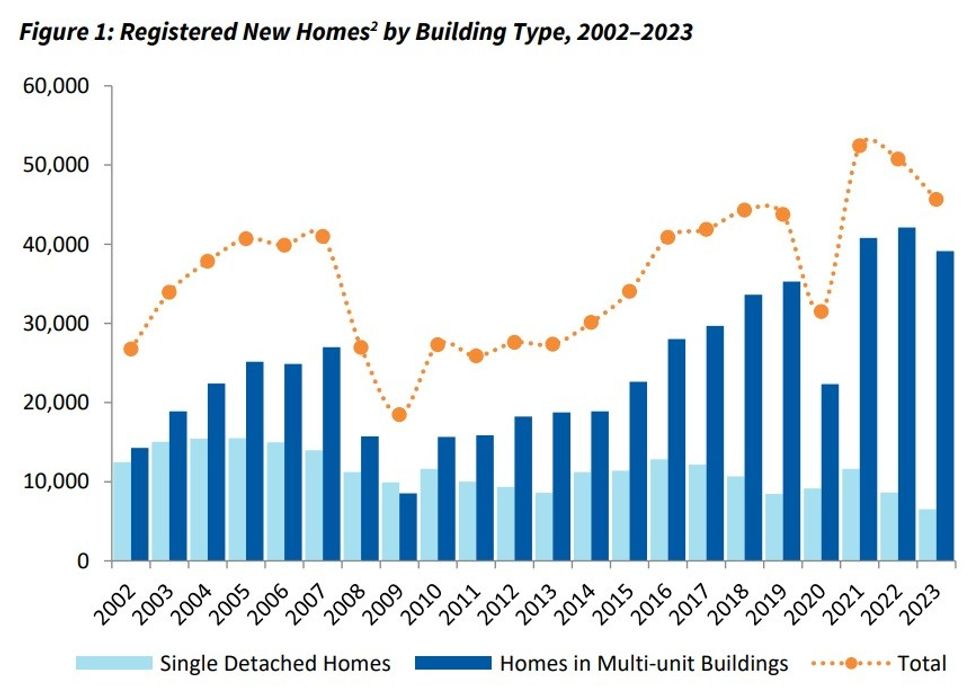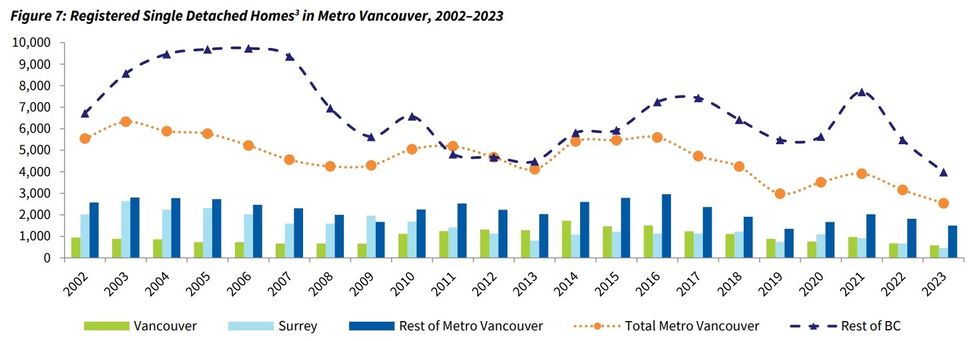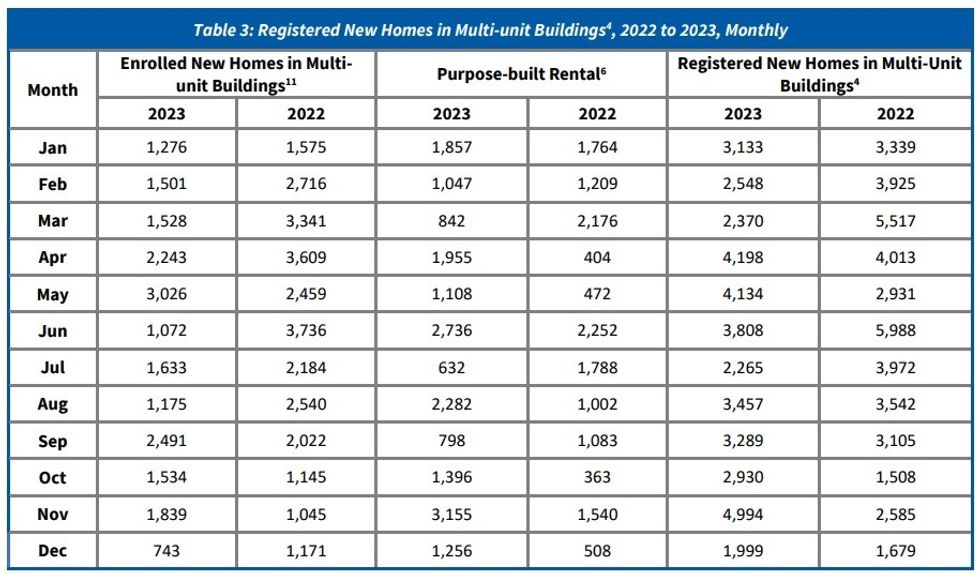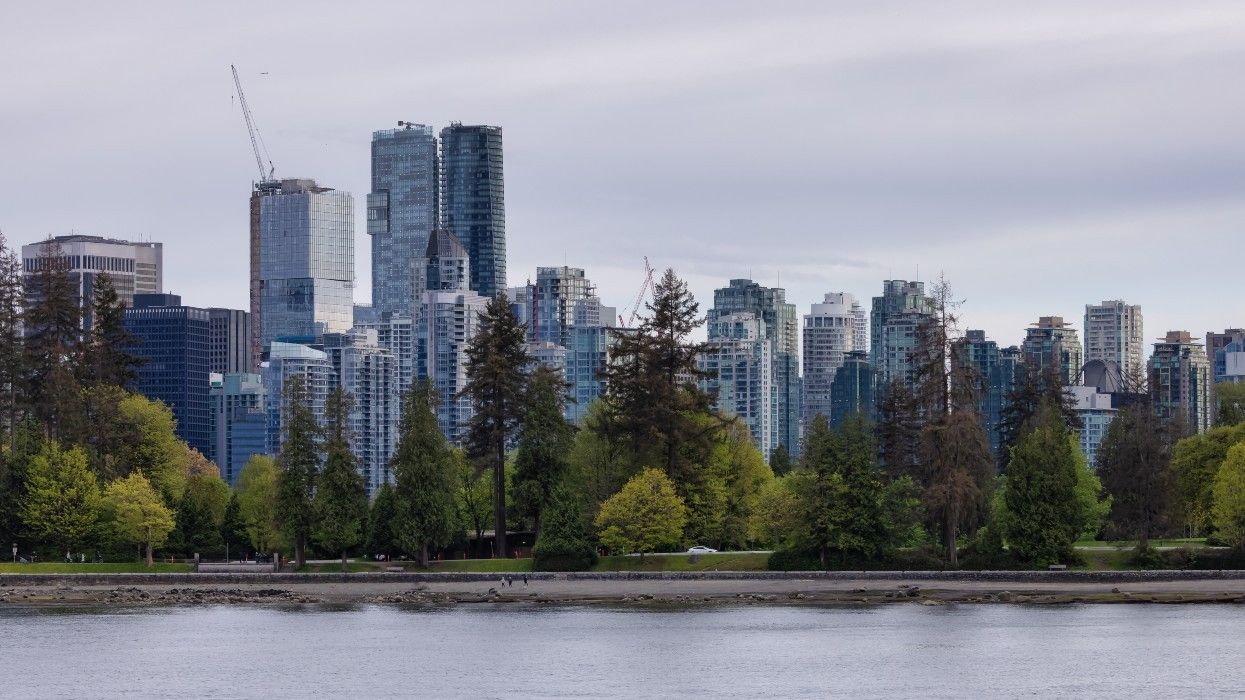Developers big and small were hindered by economic conditions over the past year, and data from the latest BC Housing new homes registry report is undoubtedly a reflection of that.
In British Columbia, all new homes must be registered with BC Housing, which enforces the Homeowner Protection Act. Registrations occur prior to the issuance of building permits and housing starts — in other words, before construction commences.
In 2023, a total of 45,647 new homes were registered across British Columbia, which is a decrease of 10% compared to 2022.

Of that total, 6,522 were single-detached homes, which saw a steep 24.5% decrease from 2022 to 2023. The cities that saw the most single-detached homes registered were Vancouver (584), Surrey (450), and Langley (302), which also led the way (in the same order) in 2022.
The month of June saw the most single-detached homes registered, at 685, while December saw the least, at 380.

Another 20,061 of the new homes registered were homes in multi-unit buildings — defined by BC Housing as non-rental apartments, semi-attached homes, and townhouses — which also saw a steep decrease, of 27.2%. The report did not provide a breakdown by city as it did for single-detached homes, but noted that New Westminster (189), Surrey (151), and Coquitlam (120) saw the largest numbers of units registered in December, out of a total of 743.
A total of 76 new multi-unit buildings were registered in December, consisting of 48 duplexes, two triplexes, five quadplexes, 15 buildings with between five and 50 units, five buildings with between 51 and 100 units, and one building with over 100 units.
Where BC saw improvement, however, was with purpose-built rentals. In 2023, 19,064 new purpose-built rental homes were registered, which represents an increase of 30.9% compared to 2022. As registrations measure the number of units planned and/or underway, this appears to indicate that developers honed in on rental homes this year, perhaps encouraged by the federal government's decision to (finally) eliminate the GST on new rental construction.
According to BC Housing, a total of 16 new rental buildings were registered in December, with one being a triplex, three being buildings with between five and 50 units, seven being buildings with between 51 and 100 units, and five being buildings with over 100 units.
Surprisingly, Langford led the way in December, seeing 597 new rental units registered, which was more than double the number registered in Prince George and more than fives times the number registered in Vancouver. November saw the highest number of new rental units registered, at 3,155, while July saw the least, at 632.

The gap between the number of new non-rental homes in multi-unit buildings (20,061) versus purpose-built rental homes (19,064) is now also significantly smaller. In 2022, those totals were at 27,824 and 14,546, respectively, so the shift is yet another sign of increased focus on rental homes — a positive, as Canada's population of renters continues to grow.
In 2016, BC Housing and the Bank of Canada together conducted a study to assess whether new home registration data can be used as a leading indicator for economic activity with the study finding that even quarterly increases in new home registrations have "statistically significant predictive content of growth in real GDP over the next one to six quarters."
However, as is commonly said when it comes to housing, people can only live in homes and cannot live in approved homes — "registered homes" in this case — and there is no guarantee when these homes will come to fruition, if at all. Macroeconomic conditions are not expected to improve for at least a few months, construction timelines are fluid, and the Province has also recently introduced multiple pieces of new legislation — the transit-oriented development legislation, most notably — that could prompt developers to reassess their plans.





















